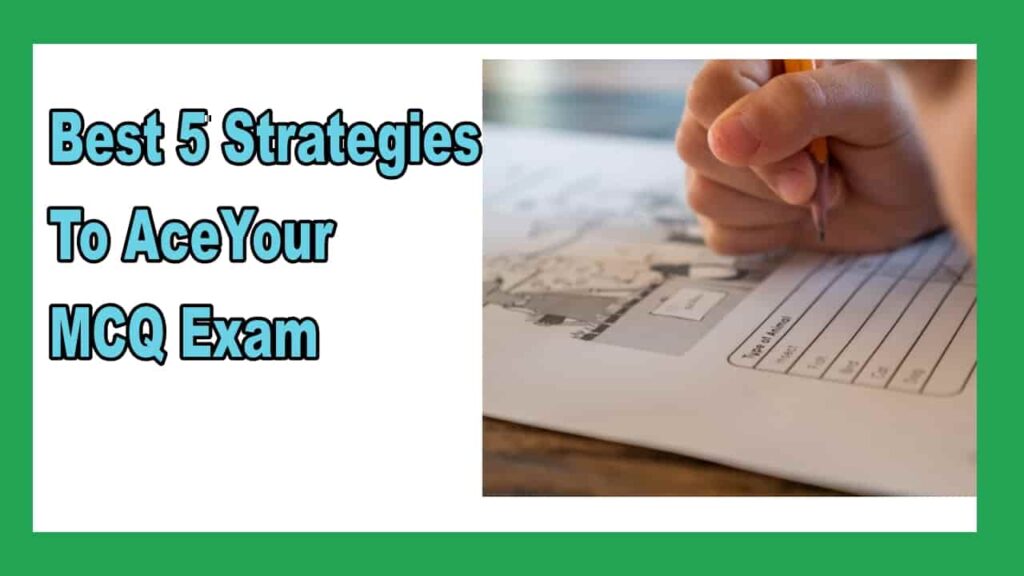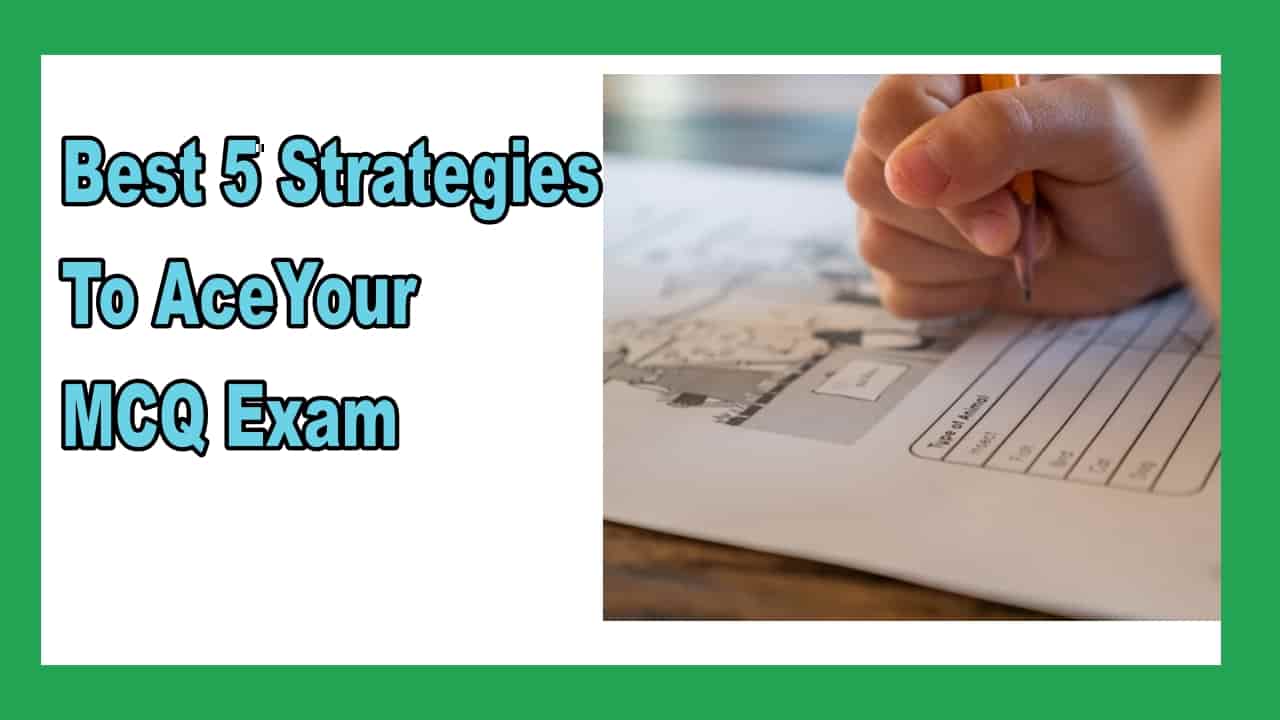What’s the full form of MCQ (Multiple Choice Questions)! no, I call it the most confusing questions. No matter what we may call it no one can deny that they could potentially be the most scoring parts of our exams and with online exams these days MCQs are the new favorites of our teachers.
So today I’m gonna give you five perfect strategies to ace your MCQ exam and10 tricks for guessing intelligently.
But before that did you know which educational the institution developed the first complete MCQ examination given below are four options and you need to give your option in the comment below.
Which educational institution developed the first complete MCQ Exam ?
a. St Edwards School, England
b. Berlin School of Business \& Innovation, Germany
c. Princeton University, USA
d. The University of Tokyo, Japan

While I reveal the correct answer at the end of the post. so let’s let’s dive straight into the five strategies to ace your MCQ exams.
1. Plan your time
Plan your time is the biggest limitation in MCQ exam . so to tackle the continuous panic of losing time here’s a very important strategy if you have one hour for your MCQ exams.
For example lets divide the Strategies into three parts
- The first 15 minutes for skimming the paper read all the questions and as you go along you will find some small very easy to solve direct questions solve them instantly and this will give you an initial boost of confidence.
- The next 30 minutes go through the rest of the questions if something is very hard don’t spend more than one minute on it. In her book, a mind for numbers the author barbara Oakley suggests the heart start to jump to easy technique.
where she says that as soon as you hit a mental roadblock shift gears and get to work on easier questions. The brain is a powerful organ it keeps working in the background.
Also, you might get some clues in some other questions.
- And the last 15 minutes this is the time to tackle those challenging problems and perhaps make some intelligent guesses for those no go questions.
And we have 10 super tricks for that coming up later on this post.
2. Don’t Rush
Don’t rush read the question twice pay attention to words like not, always which completely change the question. Also, double check the exact requirements of the question underline these words and other important keywords.
If you think the first option is correct don’t rush to circle the OMR sheet.
Make sure you read all the options carefully before choosing the answer. you never know you might find all of the above somewhere.
3. Use clues from the Question
This strategy has three subparts just like MCQs.
- First in math questions if the calculation seems too long-winded one easy method is to put the options back into the question and check if the equation balances.
- Second in English or social studies based questions use grammar as a tool to help you.
For example, this is your question
The people of Iceland –
a. Just outside the Arctic Circle a country located
b. These are most avid readers of the world
c. Claim to be successor of the Aztecs
d. The capital-Reykjavik
option a is missing the verb and option d has no connection to the people of Iceland these options can be eliminated even though both may be true and you’re finally left with option b and c.
Third check units and dimensions these will give you vital clues so if the calculation is for an area of an object for example rule out the options that are not in square units even before you begin to solve the question.
4. Context Based Memory
Sometimes we ponder over MCQ questions with foggy answers in our mind. we’re trying our level best to recall the answer it but you’re just stuck.
And to our rescue psychology has a trick called context-based memory it says that to recall some missing information try to remember where you studied that piece of information was it in a book or online, was it from a tuition teacher or from a friend.
Even trying to remember which corner of the page that graph was that may trigger your mind to connect the dots and find the missing information.
It works even if you forgot where you kept your keys and with that key information let’s move on to our next strategy.
5. Practice Practice Practice
There is no strategy to crack MCQs that beats this one. Practice every day check your answers go back to the concepts and understand the types of questions being asked.
And if you want a perfect timetable perhaps to study for any exam then I will drop a link for you in our next article.
Now you’re left with the tough questions and if there is no negative marking or maybe the negative marking is very low then perhaps you can go ahead and make some smart guesses.
So here are my 10 tricks for intelligent guessing
1. Eliminate the Options
The general formula for solving MCQ is to increase the probability of the right answer by removing all the possible wrong answers. So start by removing the options which are clearly wrong.
Sometimes you might get lucky and be left with only one option.
2. Long Tail Keywords
In his book Rock break scissors a practical guide to outguessing and outwitting almost everybody the author William Poundstone has revealed some marvelous findings through his research with huge sets of MCQ data.
His book reveals that the option with the longest statement has the highest probability of being right because the test makers have to make sure that the right answer is indisputably right.
3. Avoid The Footprint
Pound Stone also discovered that two successive questions rarely have the same correct option.
For example, if you’re solving question number 30 and find yourself clueless then look at the answer to question number 29 and question number 31 and don’t select the same letters.
They have the least probability of being correct.
4. Golden Options
Research has shown that if you don’t know the answer at all for any particular MCQ question and one of the options has either all of the above or none of the above you can bet on these options.
They have a disproportionately high probability of being correct.
one reminder: however is to make sure that either there is no negative marking in your paper or the negative marking is very low before you try guessing too many answers.
5. True versus False
In the tug of war between true and false in a true-false question Pound Stone revealed that true is more likely to be the correct answer than false.So if you’re guessing wildly then choose true.
6. Avoid North-South Options
Remove extreme values or completely unrelated values. for example, The most popular form of life on the island of Mercure is? a. Banyan Treeb. Acacia Treec. Koala Beard. Bamboo Treeyou have four options like banyan tree, acacia tree, koala bear, and bamboo tree. Clearly koala bear would be the wrong answer.
similarly with numbers remove extreme numbers when in doubt the middle order options are much safer for example
a. 100b. 150c. 200d. 300
if your options are 100, 150, 200 and 300 then perhaps 300 may not be the right answer.
7. Keywords
If two options are similar sounding or if they have the same keyword appearing in both these options chances are that one of them could be the right option.Also if two options are completely opposite chances are the right answer may be one of them.
8. Grammatically Incorrect Options
Grammatically Incorrect Options are most likely to be wrong.
9. a,b,c,d?
Pound Stone found that when a question has three options a, b, c, then there may not be any clear bias but when there were four options perhaps a, b, c and d then b had the highest probability of being right at 28 percent closely followed by c at 25 percent.
10. a,b,c,d,e?
Pound stone found that when a question has five options the fifth option had the highest probability of being right.
Conclusion
One caution here avoids guessing more than five to ten percent of the questions try to practice more learn more trust your own instinct and remember that hard work is the shortest path to success.
And now coming to our question which we asked you in the beginning and the right answer was an option a Saint Edward school, English, and kudos to all of you who guessed it right.

